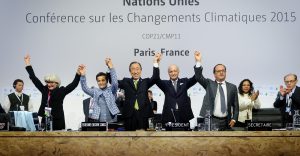
We are beginning to understand the consequences of an ‘America First’ leadership of the Global Order. And to just about any observer of it, it isn’t pretty. As we wait here today for President Trump’s announcement on the Paris Accord – and whether he pulls the United States officially out or not –the US is surely out at least for the next four years.
The retreat of US leadership from the Liberal international order continues. Maybe the most startling recent statement actually comes from two Trump officials. In an opinion piece in WSJ assessing the success of Trump’s first overseas trip to the Middle East, to NATO and to the G7 in Italy, H.R. McMaster, the White House national security advisor and D. Cohn, the director of the National Economic Council, described the America First view of the Global Order:
The president embarked on his first foreign trip with a clear-eyed outlook that the world is not a “global community” but an arena where nations, nongovernmental actors and businesses engage and compete for advantage. We bring to this forum unmatched military, political, economic, cultural and moral strength. Rather than deny this elemental nature of international affairs, we embrace it.
Now what is truly amazing about this description of the Global Order is that it is being expressed by members of the so-called ‘globalist faction’ within the Trump Administration. You must be joking! The view expressed by these two Trump officials is deeply antithetical to American policy expressed and acted on by US administrations since the end of World War II. Building collective action institutions, constructing alliances, defending the Rule of Law and calling on others to collaborate to meet the challenges of global governance and build a stable international order, this is what US leadership has been.
But this description of the Global Order is ‘dark; very dark’. It declares a zero-sum world where, ‘I win, you lose’. And the description takes the dynamic of ‘win-lose’ possibly from markets and economic competition and applies it to the Global Order itself. How these two Trump officials can talk about ‘moral strength’ is breathtaking. And yet according to these Trump officials:
America First does not mean America alone. It is a commitment to protecting and advancing our vital interests while also fostering cooperation and strengthening relationships with our allies and partners. A determination to stand up for our people and our way of life deepens our friends’ respect for America.
‘Black is white; and white is black’. How can a US withdrawal from the Paris Accord, for example – where only two states – Nicaragua and Syria – have failed to declare their own NDCs (nationally determined contribution) leave the United States anywhere but globally isolated?
And the description by these Trump officials of America First foreign policy sets up a dynamic of lose-lose that we have not seen in international relations for decades. Germany’s Chancellor, not surprisingly, and reflecting perhaps her sensitivity to an upcoming German election, has raised doubts about America’s commitment to collective action. FT‘‘s Gideon Rachman certainly paid attention to Merkel’s remarks, though he declared her remarks irresponsible, “making a statement, according to Rachman, that threatens to widen a dangerous rift in the Atlantic alliance into a permanent breach.”:
The times in which we can fully count on others are somewhat over, as I have experienced in the past few days. We Europeans must really take our destiny in our own hands. Of course we need to have friendly relations with the US and with the UK and with other neighbours, including Russia. But we have to fight for our own future ourselves.
The significance of Ms Merkel’s remarks lay in the recognition of just how fast the world is changing. The pillars of the postwar order, whether the Atlantic alliance or the institutions that give form to the shared values of the west, can no longer be taken for granted. The absence of certainty has become an organising assumption of European security. And this, hard to believe, is the moment that Britain chooses to cut loose from its own continent.
Image Credit: carbonbrief.org

